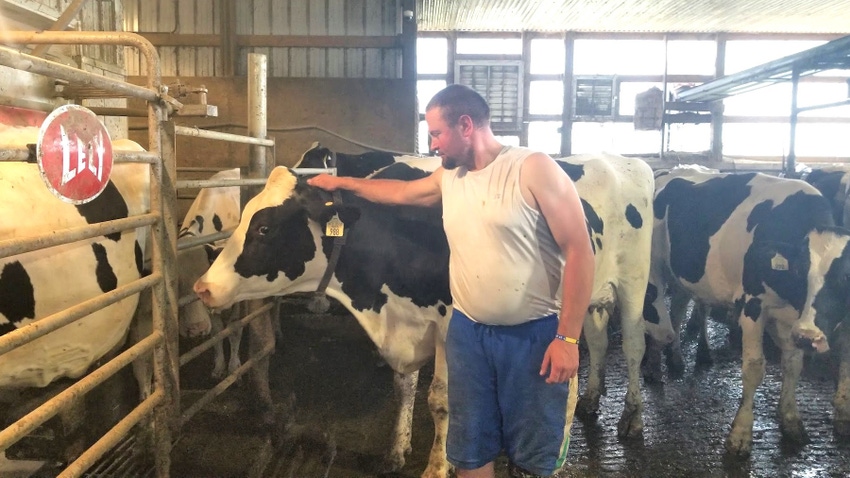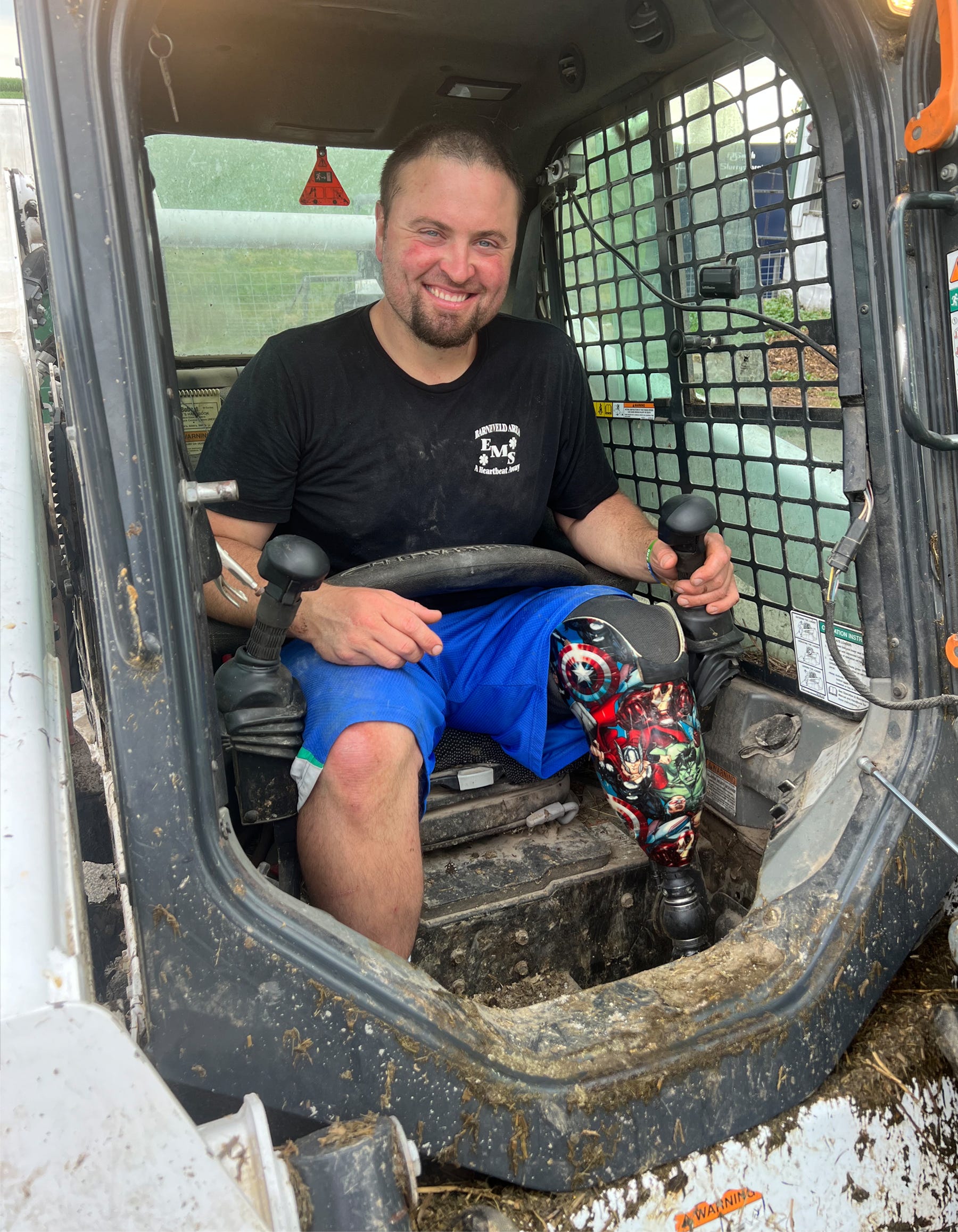December 4, 2023

After Kyle Thompson lost his left leg to a silo accident in October 2021, he struggled to carry out the basic chores he had done for years on his Iowa County, Wis., dairy farm.
But things are looking up for Thompson after he sought services provided by AgrAbility of Wisconsin and the Division of Vocational Rehabilitation in the Wisconsin Department of Workforce Development. DVR helped him acquire a side-entry skid steer to keep his barn and barnyard clean, and he will soon have a remote-control sliding machine-shed door and upright silo accommodations that will make his daily chores easier.
“It’s been a process,” Thompson told members of the AgrAbility of Wisconsin Advisory Council at a recent meeting. He has been in and out of the hospital several times since his accident, but is making progress physically and financially toward his goal of full ownership of the farm he operates with his parents, Ted and Marcia Thompson, of Barneveld, Wis.
Thompson, 35, was using a fencing breaker bar to run the last corn out of his Harvestore silo before putting new-crop corn in two years ago when the floor auger caught the bar and pulled his foot into the auger. First responders were on the scene within minutes, but there was no saving his foot or lower leg.
A few months after the accident, Thompson was fitted with a prosthesis to help him move about his farm. But still, he struggled to get in and out of his skid steer. Climbing over the bucket and into the cab is not an easy task with his disability.
Thompson heard about the services offered by AgrAbility of Wisconsin and called to see if the program could help. AgrAbility officials work closely with DVR to provide assistive technology for farmers with disabilities.

NEW SKID STEER: DVR helped Kyle Thompson acquire a side-entry skid steer, and he will soon have a remote-control sliding machine-shed door and upright silo accommodations to make his chores easier to do.
For years, AgrAbility Advisory Council members have heard about roadblocks standing in the way of farmers accessing DVR services. A minimum-wage threshold has been a hurdle that turned away many farmer applicants in recent years, but council members were told that more farmers have been approved during the past year, and that Thompson is a good example of how the program can work.
The AgrAbility program is a partnership between the University of Wisconsin-Madison Division of Extension and Easterseals Wisconsin. The Easterseals Farm Program has rural rehabilitation specialists who work with farmers with disabilities to identify limitations affecting farm tasks and discuss what accommodations might be made to help them continue farming. The Farm Program relies on DVR for the funding to modify farm equipment and buildings for farmers.
Policy change
Jeff Kratochwill, Farm Program director, says DVR made a policy change two years ago that allows farmers to use a debt-to-asset ratio assessment as an alternative to the minimum-wage requirement. Because of that change, more farmers have been able to access DVR services.
“The truth is, there has been a ton of progress,” Kratochwill says of the improved access through DVR. “We still have a long way to go, but the program is helping farmers. [Farm Program officials] are meeting with the DVR every quarter, discussing issues and sharing statistics on how many farmers are enrolled. We’re looking to address some of the concerns about the amount of time the process takes.”
Paul Leverenz, president and CEO of Easterseals Wisconsin, says about 70% of farmers who apply for services don’t meet the minimum-wage requirement established by DVR, but the vast majority meet the newly established debt-to-asset ratio. He says he would like to see the program improve to the point that farmers access services within 10 months of when they apply.
Kratochwill says the DVR counselor who worked with Thompson could see that he needed help and wanted to offer assistance.
“That alone makes all the difference in the world in moving things along,” Kratochwill says. “She asked appropriate questions and trusted what I was saying.”
DVR helped Thompson acquire a side-entry JCB skid steer and approved cameras for the top of his silos to monitor activity. A harness system will also be installed in his silos to make it safer to climb, and a remote-control sliding machine-shed door has been ordered.
“Kyle’s story is a good example of how it could work,” Kratochwill says. “I’m still looking for that consistency with the program. It’s still too complicated and takes too long. But it gets a little bit better every year.”
Thompson milks about 70 cows with a Lely robotic milking system and farms 365 acres. The robotic system was installed before his accident.
Hurdles faced
Kratochwill says a survey was conducted of farmers who tried to access DVR services to determine what hurdles they faced. Farm Program and DVR officials are working together to address those concerns. He says the agency is planning to make small modifications to the program to make services more accessible to farmers.
Since 1991, AgrAbility has provided assistance to about 2,500 farmers who have been able to continue farming through the program’s intervention. Brian Luck, program director, describes the Wisconsin program as “the best AgrAbility program in the nation.” There are currently 21 USDA-funded state and regional AgrAbility projects providing services in 22 states.
The Wisconsin program has 360 active clients and started or reopened 53 cases during the past year. The three most common types of agricultural operations served are dairy, livestock and grain farms. The leading primary disabilities are joint injuries, back injuries, arthritis, amputations and orthopedic injuries.
For more information, visit the AgrAbility of Wisconsin website, email [email protected] or call 608-262-9336.
About the Author(s)
You May Also Like




